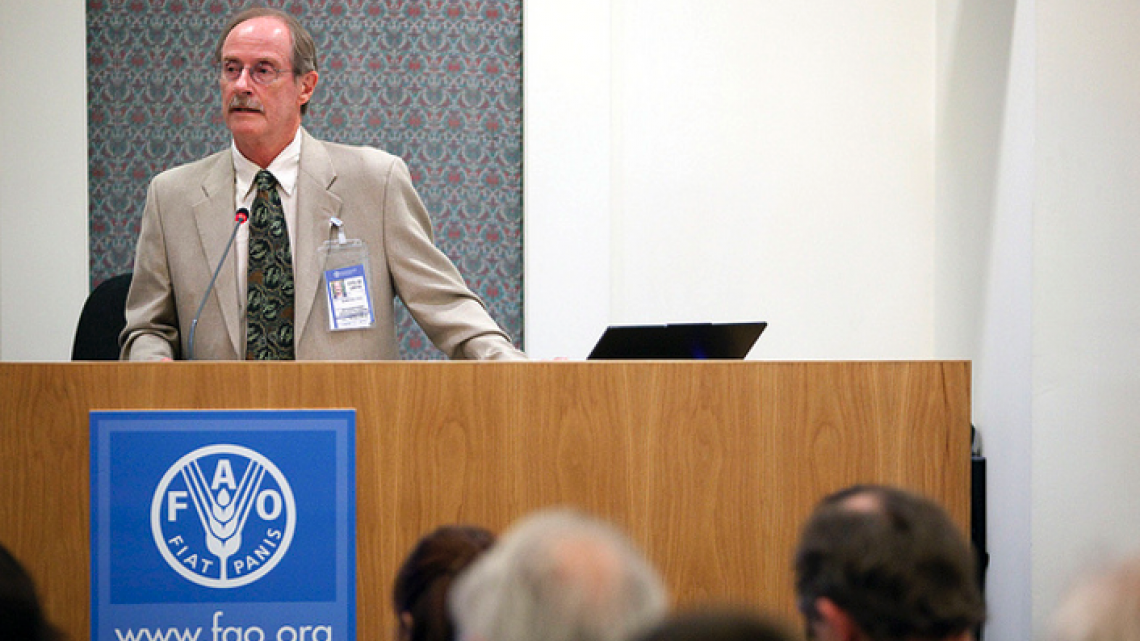
Phil McMichael addresses the Committee on World Food Security at U.N. FAO in Rome on October 12, 2010. Credit: Alessandra Benedetti/FAO
News directly from Cornell's colleges and centers
International development scholar Phil McMichael retires
By
Phil McMichael, whose decades of research in global food justice has reshaped thinking around rural and international development, will become professor emeritus of global development on July 1.
A renowned teacher, mentor, researcher and author, McMichael is internationally recognized for his scholarship in rural development and other social science disciplines. His scholarship promoting an equitable, sustainable and just food system has resonated with academics as well as grassroots activists in diverse settings, from South and East Asia to Latin America.
“To be one of the world’s most influential scholars in food studies and international development is an extraordinary accomplishment. But to be one of the most respected and admired and well-loved scholars at the same time is quite rare – yet Phil McMichael has managed it throughout his extraordinary career,” said Jun Borras, professor of agrarian studies at the International Institute of Social Studies (ISS) at The Hague. “Despite his towering stature, Phil sincerely listens to and respects other researchers including those who come from less prominent institutions and those from the Global South, as well as non-academic public intellectuals from social movements.”
McMichael formulated with Harriet Friedmann the concept of international food regimes to examine the relationship between markets and states in shaping periods of relative stability and change in the global food system. His core ideas inspired an entire field of study into global food justice, and he later expanded the food regime concept to include ecological and social movement perspectives. This attracted attention from the International Planning Committee for Food Sovereignty (IPC), which invited him to co-author their summary declaration to the FAO’s High Level Conference on World Food Security in 2008 in Rome. And in 2016 he was invited to present a lecture on the utility of "food regime" theory to senior staffers of the FAO’s Food Security, Food Systems and Nutrition Programme.
A distinguished author, McMichael’s first book, “Settlers and the Agrarian Question: Capitalism in Colonial Australia,” examined the formation of a settler-colonial society in Australia in the context of the changing fortunes of the British empire throughout the 19th and early 20th centuries. His writing won the prestigious Allan Sharlin Memorial Book Award of the Social Science History Association in 1985 in recognition of discerning and meticulous research. His most recent book, “Food Regimes and Agrarian Questions” (2013), has been translated into eight languages, and he has co-edited seven other books and authored over 150 articles and chapters.
“Phil is among the most influential scholars of his generation, combining a sophisticated grasp of historical methods with a deep knowledge of foundational debates in the social sciences,” said Fouad Makki, associate professor of global development and director of the Polson Institute for Global Development.
McMichael took inspiration from his undergraduate lectures and students to reframe the subject of development as a global project rather than a non-Western deficit in a textbook first published in 1996 (and now five language translations). Now in its seventh edition, “Development and Social Change: A Global Perspective” is considered a classic textbook on international development. The book weaves together an analysis of historical, current and emergent issues in international development with accessible language.
“Phil’s writing introduced several generations of students to the complexities of global development,” said Lori Leonard, chair and professor of global development.
A lively and charismatic instructor, McMichael earned a reputation as a dynamic undergraduate course instructor. Along with his own courses, he co-developed the Community Food Systems minor to engage Cornell undergraduate students with issues related to food security, food sovereignty and food justice. Launched in 2016, the minor integrates community-based learning and research with multidisciplinary course work so that students can understand and contribute to sustainable and equitable food systems.
McMichael has been an influential presence for students at both the undergraduate and graduate levels. He chaired more than 30 doctoral committees and was a highly sought-after mentor for young scholars.
“Phil’s prominence as an agrarian scholar has been equally matched by his commitment to teaching and mentorship,” said Sara Keene, Ph.D. ’15. “He demands a level of intellectual rigor from his students that is both challenging and stimulating.”
Ian Bailey, Ph.D. ’14, said, “Professor McMichael has an unparalleled ability to generate dialogue in the classroom that consistently spilled over into hours of debate and discussion at the end of each three-hour seminar.”
Since 2011, McMichael has been actively involved in the United Nations’ Committee on World Food Security (CFS) through the Civil Society Mechanism (CSM), which represents the diverse interests and rights of producers, farm workers and Indigenous peoples on food system front lines. McMichael’s involvement has provided important insights from a historical and social justice perspective to UN policy debates: for example on establishing Principles for Responsible Investment in Agriculture (CFS RAI) in context of escalating (and often speculative) land enclosure for feed and fuels crops at the expense of food crops, and on current controversies regarding the upcoming UN Food System Summit to be held September 2021 in New York. This UN work has also allowed him to alert ‘mainstream’ social science to the power of food in international relations and global governance, providing updates on CFS debates and policies -- most recently in his co-edited book with Hilde Bjørkhaug and Bruce Muirhead, “Finance or Food? The role of cultures, values and ethics in land use negotiations” (University of Toronto Press, 2020).
Media Contact
Get Cornell news delivered right to your inbox.
Subscribe
